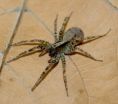(Press-News.org) New research from the University of Cincinnati provides food for thought.
The research examined how short-term and long-term hunger affected mate selection and aggression in female wolf spiders (Schizocosa ocreata) commonly found in the eastern United States and Canada. These female spiders are potentially aggressive and cannibalistic when approached by a courting male.
The research is published in the April 2011 print issue of the journal, "Animal Behavior." It was carried out by George Uetz, UC professor of biology, and former UC doctoral student Brian Moskalik, now a postdoctoral teaching fellow at College of the Holy Cross, Worcester, Mass.
According to Uetz, this research helps indicate what might result if environmental changes affect food resources for animal populations, shedding light on the possible effects of scarce resources on short- and long-term mating preferences and potential long-term population dynamics.
He added, "For instance, we had a drought this past summer, and we saw smaller spiders in the fall. This spring, we're getting a lot of rain, which will likely mean more insects and an abundant food supply for spiders. That should mean well-fed spiders this year – and, according to our research, that will affect spider mating choices."
SATIATED (WELL-FED) FEMALE SPIDERS
Hunger does affect female spiders' receptivity to mating, with well-fed females showing the most overall receptivity to mate and the least aggression. These satiated females were, however, quite choosy, and were most receptive to large-bodied males with large leg tufts (an indication of success in foraging for food). As they aged, they showed lower levels of aggression, and that aggression was directed toward small-bodied males with small leg tufts.
SHORT-TERM STARVATION
Overall, female spiders that experienced short-term starvation showed relatively little receptivity to mating and higher levels of aggression. The aggression was strongest toward small-bodied males with shorter leg tufts. This aggression was seen in these females both shortly after maturation and as they aged.
However, as these females aged, they increased their receptivity to mate with large-bodied males.
LONG-TERM STARVATION
Early in adulthood, female spiders that experience long-term starvation were most receptive to mating with large-bodied males regardless of the size of leg tufts of hair. At the stage of early maturation, however, they were extremely aggressive toward small-bodied males.
As these females aged, they continued to show preference for large-bodied males, especially those with large leg tufts. While aggression toward small-bodied males continued, it decreased in intensity.
CONCLUSION
In general, large-bodied males with large leg tufts were the most preferred by both satiated and hungry females. They were also less likely to be cannibalized, thus – in all probability – increasing the population of "attractive," high-quality males.
"These results suggest that hungry females are making a trade-off, mating with preferred males and eating the less-desirable ones," said Uetz.
Said Moskalik, "Still, a general trend apparent in the results suggests that as unmated female spiders age, they become less aggressive. So, males that are typically unattractive to females when those female are early in the maturation period may be given mating opportunities as the female population ages."
To control for differences in male behavior, the UC researchers used video playback with digitized courting males in their experiments. The males' size and indicator traits (leg tufts) were altered to reflect either large size and good condition or to reflect poorly fed smaller males.
INFORMATION:
Funding for this research was provided by the National Science Foundation, the American Arachnological Society and the University of Cincinnati, with support from the Cincinnati Nature Center.
When food is scarce, hungry female spiders alter mating preferences
2011-04-02
ELSE PRESS RELEASES FROM THIS DATE:
EOBR Rule Aims to Keep Truckers Honest
2011-04-02
More than half of the commercial vehicle drivers who responded to United Safety Alliance, Inc.'s online survey admitted to deliberately violating federal Hours of Service (HOS) regulations. Those regulations aim to keep highways safe by limiting driving time so commercial vehicle drivers get enough rest.
Currently, HOS compliance is monitored through paper logs and supporting documentation such as toll receipts. However, paper logs allow for falsification. For that reason, the Federal Motor Carrier Safety Administration (FMCSA) is looking to shift to an automated means ...
Short rotation energy crops could help meet UK's renewable energy targets
2011-04-02
Planting short rotation energy crops on England's unused agricultural land could produce enough biomass to meet renewable energy targets without disrupting the food industry or the environment, according to research led by Professor Gail Taylor from the University of Southampton.
The study, funded by the UK Energy Research Centre (UKERC), is a rare investigation into energy crop supply which looks at the potential of planting short rotation coppice (poplar and willow) in England, taking into account social, economic and environmental constraints. It found that with efficient ...
Slipping and Falling on an Icy Connecticut Sidewalk
2011-04-02
January 2011 was the snowiest January that Connecticut has seen since records were first kept in 1905. While one would expect snow and ice accumulation to impact commute times, such accumulation also has had impact on sidewalks, making outside entrances to businesses and houses slippery and dangerous. In fact, according to the Brookfield Patch, snow and ice-related accidents are unusually high this year. Tom Rizzo, spokesman for the Westchester District of the United States Postal Service, also told the Yorktown Patch that there have been 57 accidents due to slips and falls ...
Proposed Federal Immigration Law Promotes Enforcement, Reduces Opportunity
2011-04-02
Federal legislation proposed by Republican Senator Orrin Hatch seeks to force local law enforcement agencies to further assist federal immigration policy or lose funding. Senate Bill 332, the Strengthening Our Commitment to Legal Immigration and America's Security Act, also eliminates the diversity visa, an immensely popular program that allows for 50,000 lottery-based visas every year. Several other provisions involving exit procedures, welfare benefits and drug crimes round out the wide-ranging bill. But some commentators are already calling the effort a political ploy ...
When washing becomes a compulsion
2011-04-02
Obsessive-compulsive disorder is often diagnosed too late in children and adolescents. In the current issue of Deutsches Ärzteblatt International (Dtsch Arztebl Int 2011; 108: 173-79), Susanne Walitza and her colleagues point out that appropriate early recognition and treatment can positively affect the course of the disease.
Compulsive washing, the most common obsessive-compulsive manifestation among children and adolescents, is present in up to 87% of all patients; other common types are compulsive repetitive behavior and checking, and obsessive thoughts of an aggressive ...
Sleeping through danger: the dormouse approach to survival
2011-04-02
The dormouse in Alice in Wonderland was well advised to stay asleep – especially as doing so did not prevent it from taking a full part in the tea-time conversation. Dormice in Europe spend about eight months of the year asleep and are extremely safe during this extended period, with almost all of them surviving the winter. This result comes from a study of dormouse survival rates in Austria, the Czech Republic, England, Germany and Italy.
Karin Lebl was a PhD student in Ruf's group. Together with collaboration partners in these countries, she examined how the survival ...
A new experimental diagnostic test able to quickly distinguish infection from tuberculosis disease
2011-04-02
A potential new experimental diagnostic test able to quickly distinguish individuals with active tuberculosis (TB) from those with latent TB infection has been developed. If the preliminary results of the study will be confirmed in a larger population sample, the new diagnostic system could allow more effective strategies to control the spread of the re-emerging pathology.
The work was performed by a group of scientists from the Catholic University of Rome, the National Institute of Infectious Diseases "L. Spallanzani" of Rome and the University of Sassari, in a study ...
Anti-Hispanic Discrimination Still Felt Around the Country
2011-04-02
A recent survey performed by the Pew Hispanic Center (PHC) found that over 60 percent of Hispanics polled still feel that they are the victims of national origin bias. The PHC -- a nonpartisan, nonprofit research group -- is focused on tracing trends in attitude and lifestyle that affect Latinos and others of Hispanic origin living in America.
The striking percentage of disenfranchised Hispanics is a sharp uptick in the numbers of those who felt discriminated against in recent years, and most blame the rise in bias as being the direct result of America's highly publicized ...
Advance in microchannel manufacturing opens new industry applications
2011-04-02
CORVALLIS, Ore. – Engineers at Oregon State University have invented a new way to use surface-mount adhesives in the production of low-temperature, microchannel heat exchangers - an advance that will make this promising technology much less expensive for many commercial applications.
This type of technology will be needed, researchers say, in next-generation computers, lasers, consumer electronics, automobile cooling systems, fuel processors, miniature heat pumps and more.
New industries and jobs are possible. A patent has been applied for, the findings reported in ...
'SKIP'-ing splicing forces tumor cells to undergo programmed cell death
2011-04-02
LA JOLLA, CA—When cells find themselves in a tight spot, the cell cycle regulator p21 halts the cell cycle, buying cells time to repair the damage, or if all else fails, to initiate programmed cell death. In contrast to other stress-induced genes, which dispense with the regular transcriptional entourage, p21Cip1 still requires SKIP, a transcription elongation factor that also helps with the editing of transcripts, to be expressed, found researchers at the Salk Institute for Biological Studies.
In the absence of SKIP, the expression of p21Cip1 is rapidly down-regulated, ...

